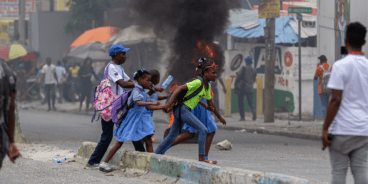
Remarks delivered at UN General Assembly Ministerial Side Event on “Building the Foundation for Justice in Syria”
Remarks delivered by Dr. Simon Adams, Executive Director of the Global Centre for the Responsibility to Protect on 21 September 2017 at UN Headquarters in New York. The Ministerial side event was hosted by the governments of Liechtenstein and Qatar.
I would like to thank the co-hosts of this important event, the Minister of Foreign Affairs of Liechtenstein and the Minister of Foreign Affairs of the State of Qatar. I would also like to welcome the recent appointment of Ms. Catherine Marchi-Uhel as head of the International, Impartial and Independent Mechanism for Syria, and look forward to the expeditious appointment of the rest of the Mechanism’s team by the UN Secretary-General.
For the past six and a half years, various parties to the Syrian conflict have conducted indiscriminate attacks on civilians, perpetrated sexual violence, deliberately blocked humanitarian aid, bombed hospitals and humanitarian workers, and used food as a weapon to starve besieged communities. We have even seen the gradual and partial normalization of the use of illegal, immoral and indiscriminate chemical weapons, despite the fact that the prohibition of such weapons is one of the oldest norms of the international community, dating back to 1899.
People with direct experience of these atrocities, including our colleagues and friends from the White Helmets, are here with us today. We thank them for their humanitarian efforts and acknowledge the tragic deaths of so many of their members in airstrikes, barrel bombs and other crimes committed against Syrian civilians.
Throughout the Syrian conflict, despite the ongoing commission of these war crimes and crimes against humanity, the Security Council has been consumed by internal political divisions and has been unable to uphold its responsibility under the UN Charter to maintain international peace and security. Before the establishment of the IIIM, six vetoes in the Council prevented meaningful action from being taken, clearly demonstrating the need for all Security Council members to adhere to the ACT Code of Conduct in mass atrocity situations, which has been signed by 114 states.
The cycle of impunity in Syria has served to embolden perpetrators of atrocities across the globe, resulting in the largest number of displaced civilians since the Second World War.
The establishment of the IIIM represented the unwillingness of the UN General Assembly to accept the failure and inaction of the Security Council, and directly challenges this climate of impunity. When the Security Council fails to end war crimes and crimes against humanity, the General Assembly can and should fill that gap.
Just as impunity often begets impunity, international justice can be contagious.
Efforts to achieve accountability for atrocities perpetrated in other countries are slowly advancing. After years of delay, this month a memorandum of understanding was signed between the African Union and the Government of South Sudan regarding the establishment of the Hybrid Court. Earlier today we saw the Security Council mandate a team of experts to investigate atrocities committed by Da’esh in Iraq. And it is possible that next week the Human Rights Council may finally and belatedly vote to establish an international and independent investigation into alleged atrocities committed in Yemen. We encourage all UN member states to support these efforts to advance accountability for mass atrocities.
But here today, we urge all UN member states to cooperate fully with the IIIM and facilitate the work of Ms. Marchi- Uhel and her team through the provision of voluntary funding and technical assistance. We make this call knowing that while the IIIM can not end the suffering of Syrian civilians, it can ensure that at least the perpetrators of these atrocities will one day face justice. In this context, the IIIM should be seen as the first step, not the last step, away from impunity and towards accountability in Syria.
Thank you.
Related Content


11th Meeting of the Global Network of R2P Focal Points Outcome Document
